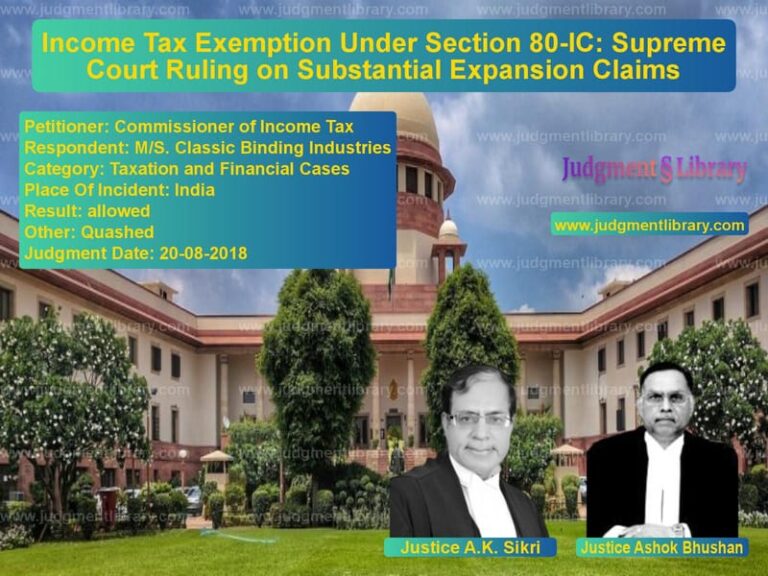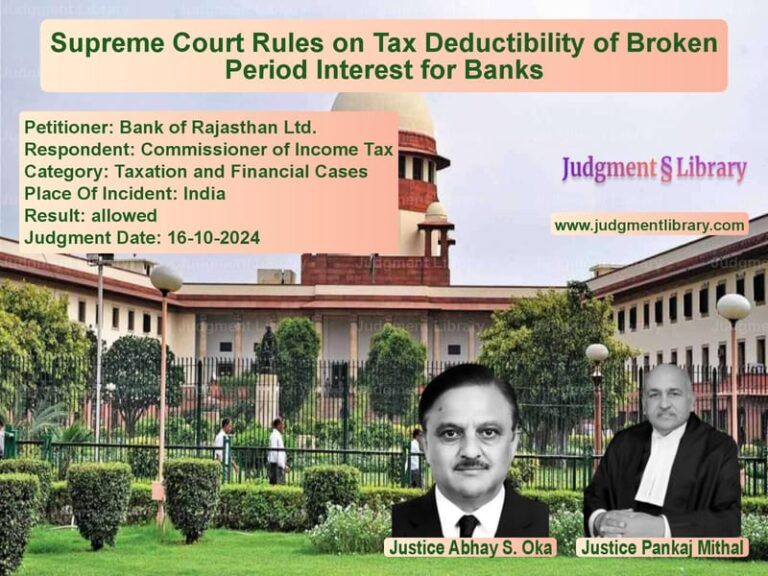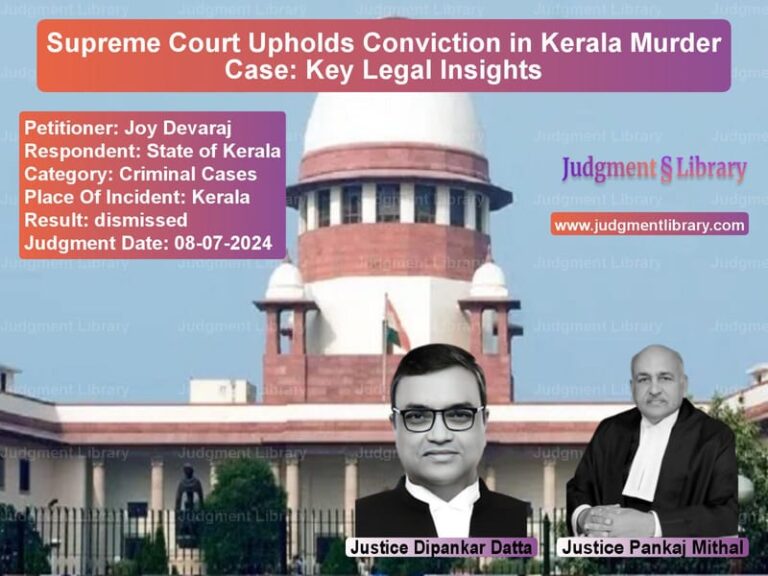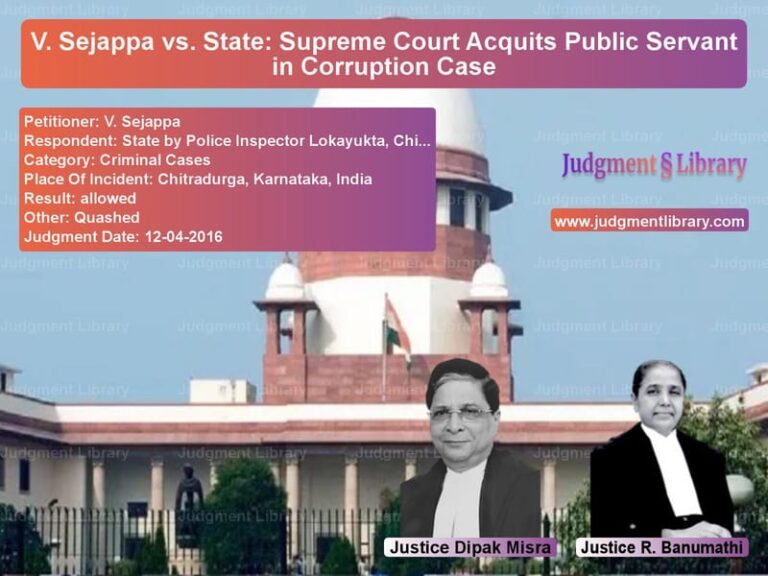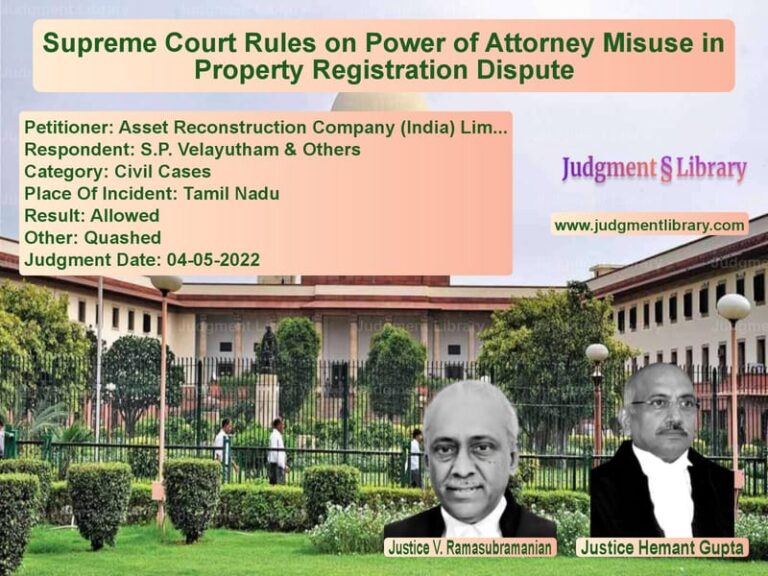Supreme Court Allows Recall of Witness in Data Theft Case Under Section 311 CrPC
The Supreme Court of India recently ruled in the case of Satbir Singh v. State of Haryana & Ors., addressing the critical issue of recalling a witness under Section 311 of the Criminal Procedure Code (CrPC). The case stemmed from allegations of data theft, where the appellant claimed that former employees had stolen company data and used it to manufacture similar products. The key issue before the Court was whether the recall of a witness should be permitted when new forensic evidence emerges during the trial.
Background of the Case
The case originated when Satbir Singh, the appellant, accused former employees of stealing proprietary company data. The stolen data was allegedly used to develop competing products. During the trial, the prosecution relied on forensic analysis by the Central Forensic Sciences Laboratory (CFSL). However, at the time when Satbir Singh’s evidence was recorded, the CFSL report had not yet been presented.
On August 20, 2021, the CFSL expert testified in court but did not provide any comparative analysis to establish whether the recovered data matched the alleged stolen data from the appellant’s company. Realizing the gap in evidence, the appellant filed an application on August 25, 2021, seeking to be recalled as a witness to address this crucial aspect.
Legal Issues Raised
The Supreme Court had to determine:
- Whether recalling a witness under Section 311 CrPC was justified when forensic evidence introduced later in the trial necessitated further testimony.
- Whether denying recall of the witness would result in a miscarriage of justice.
- Whether the request for recall was a genuine necessity or a dilatory tactic aimed at delaying the trial.
Petitioner’s (Satbir Singh’s) Arguments
- The CFSL report was presented after his initial testimony, making it impossible for him to comment on the forensic findings at that time.
- The comparison of data was the crux of the case, and without it, the trial would lack critical evidence.
- The application for recall was made promptly, within five days of the CFSL expert’s testimony.
- Denying recall would amount to procedural unfairness, as the appellant had no prior opportunity to address the comparison of data.
Respondent’s (State of Haryana) Arguments
- The appellant was using recall as a strategy to fill gaps in the prosecution’s case, which is not permissible under Section 311 CrPC.
- The accused had the opportunity to cross-examine the CFSL expert and could challenge the findings during final arguments.
- Granting recall would cause unnecessary delays and prolong the trial.
Supreme Court’s Analysis and Judgment
The Supreme Court ruled in favor of the appellant and allowed the recall of the witness, emphasizing the following points:
- Purpose of Section 311 CrPC: The Court reiterated that Section 311 empowers courts to summon or recall witnesses at any stage of the trial if their testimony is essential to a just decision.
- Judicial Discretion: The Court cited Ratanlal v. Prahlad Jat (2017) and Vijay Kumar v. State of U.P. (2011) to reaffirm that recall should be exercised judiciously and not as a routine measure.
- Evidence Essential for Just Decision: The Court stated: “The comparison of the stolen data with the CFSL report is the core issue of the case. Denying the appellant an opportunity to address this would reduce the trial to a farce.”
- No Prejudice to the Accused: The Court held that the accused would still have the opportunity to cross-examine the recalled witness, ensuring fairness.
- Timely Application: Since the recall application was filed within five days of the CFSL expert’s deposition, it was deemed a genuine request rather than a delay tactic.
Directions Issued
The Supreme Court issued the following directions:
- The appellant was allowed to be recalled as a witness for further examination.
- The trial court was instructed to conclude the re-examination within six weeks.
- The entire trial was to be completed within nine months to prevent undue delays.
Significance of the Judgment
This ruling sets a crucial precedent in criminal trials:
- Ensuring Fair Trial: It reinforces that courts must allow witness recall when new evidence arises that is critical to the case.
- Proper Use of Forensic Evidence: The judgment clarifies that forensic reports should be fully examined in trial and not merely submitted as technical documents.
- Balanced Approach: The Court struck a balance by allowing recall while also setting a strict timeline to prevent unnecessary delays.
Conclusion
The Supreme Court’s decision in Satbir Singh v. State of Haryana & Ors. is a landmark ruling that reaffirms the importance of allowing recall of witnesses in cases where new evidence emerges during trial. By permitting the appellant to be re-examined, the Court has ensured that procedural fairness is maintained while also preventing undue delays. This judgment will serve as a guiding principle for future cases where recall of witnesses is sought under Section 311 CrPC.
Petitioner Name: Satbir Singh.Respondent Name: State of Haryana & Ors..Judgment By: Justice Ahsanuddin Amanullah, Justice S.V.N. Bhatti.Place Of Incident: Haryana.Judgment Date: 29-08-2023.
Don’t miss out on the full details! Download the complete judgment in PDF format below and gain valuable insights instantly!
Download Judgment: satbir-singh-vs-state-of-haryana-&-o-supreme-court-of-india-judgment-dated-29-08-2023.pdf
Directly Download Judgment: Directly download this Judgment
See all petitions in Fraud and Forgery
See all petitions in Cyber Crimes
See all petitions in Judgment by Ahsanuddin Amanullah
See all petitions in Judgment by S.V.N. Bhatti
See all petitions in allowed
See all petitions in supreme court of India judgments August 2023
See all petitions in 2023 judgments
See all posts in Criminal Cases Category
See all allowed petitions in Criminal Cases Category
See all Dismissed petitions in Criminal Cases Category
See all partially allowed petitions in Criminal Cases Category


